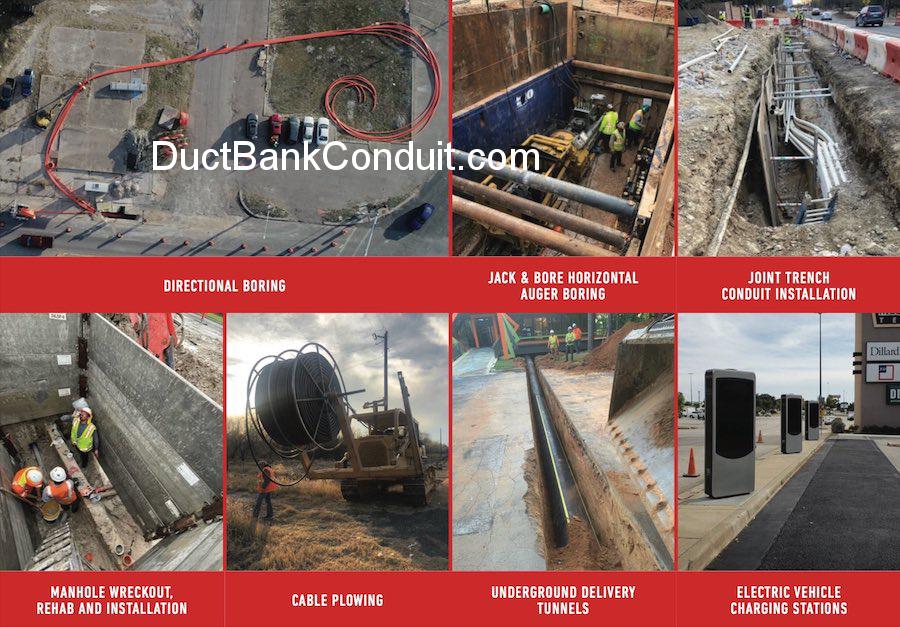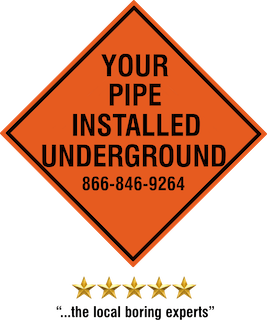Solar Farm Contractor
Duct Bank Conduit - Solar Farm Contractor
Solar farm contractors often use a range of trenchless and boring techniques to streamline infrastructure installation, reduce environmental impact, and meet project requirements efficiently. Here’s how the listed methods and technologies are utilized:
Duct Bank Conduit - Solar Farm Contractor Companies
Horizontal Directional Drilling (HDD)
- Purpose: To install underground conduits, cables, and pipes for solar farm electrical systems without significant surface disruption.
- Applications:
- Crossing under roads, railroads, creeks, or rivers to lay medium-voltage cables.
- Running conduits to connect solar arrays to inverters and substations.
- Ensuring minimal environmental impact in sensitive areas.
Directional Boring
- Purpose: Used for precise underground installations with minimal excavation.
- Applications:
- Laying utility lines beneath existing infrastructure such as parking lots, roads, or railroads.
- Routing electrical conduits to connect solar panels to grid connections.
- Preserving the surface integrity of farmland or landscaped areas.
Trenchless Technology
- Purpose: Enables underground work without open trenches, reducing disruption to the environment and land use.
- Applications:
- Installing duct banks for electrical cabling over long distances.
- Crossing under environmentally sensitive areas without damaging the surface ecosystem.
Horizontal Auger Boring
- Purpose: Effective for short, straight-line installations, especially under railroads or roads.
- Applications:
- Installing casing pipes for medium-voltage cables or conduits.
- Utility crossings where precision and speed are critical.
Jack and Bore
- Purpose: A method to install larger-diameter casing pipes under highways, railroads, or other critical infrastructure.
- Applications:
- Supporting the installation of heavy-duty conduit systems.
- Providing protection for power lines crossing under critical areas.
Electric and Medium-Voltage Infrastructure
- Purpose: Ensures efficient power transmission within the solar farm and to the grid.
- Applications:
- Running medium-voltage cables underground using trenchless methods to connect arrays, inverters, and substations.
- Maintaining safe and efficient electrical systems across the farm.
Roads and Railroad Crossings
- Purpose: Ensure utility infrastructure can cross without interrupting transportation systems.
- Applications:
- HDD and auger boring used to install conduit under existing roads and railroads to minimize traffic disruption.
- Protecting cables and conduits from surface loads and vibrations.
Creek and River Crossings
- Purpose: To run utilities across waterways with minimal environmental impact.
- Applications:
- HDD is the preferred method for crossing water bodies to avoid disturbing aquatic ecosystems.
- Installing conduits to connect solar arrays on either side of a waterway.
Duct Bank and Conduit Construction
- Purpose: Organizes and protects multiple electrical or communication cables.
- Applications:
- Laying duct banks beneath solar farms for efficient cable management.
- Using trenchless methods to install conduit systems across challenging terrain or infrastructure.
Duct Bank Conduit - Solar Farm Contractor Near Me
These methods collectively allow solar farm contractors to meet the growing demand for renewable energy infrastructure while minimizing environmental and societal disruptions. Each technique is chosen based on the specific project requirements, terrain, and infrastructure constraints.


